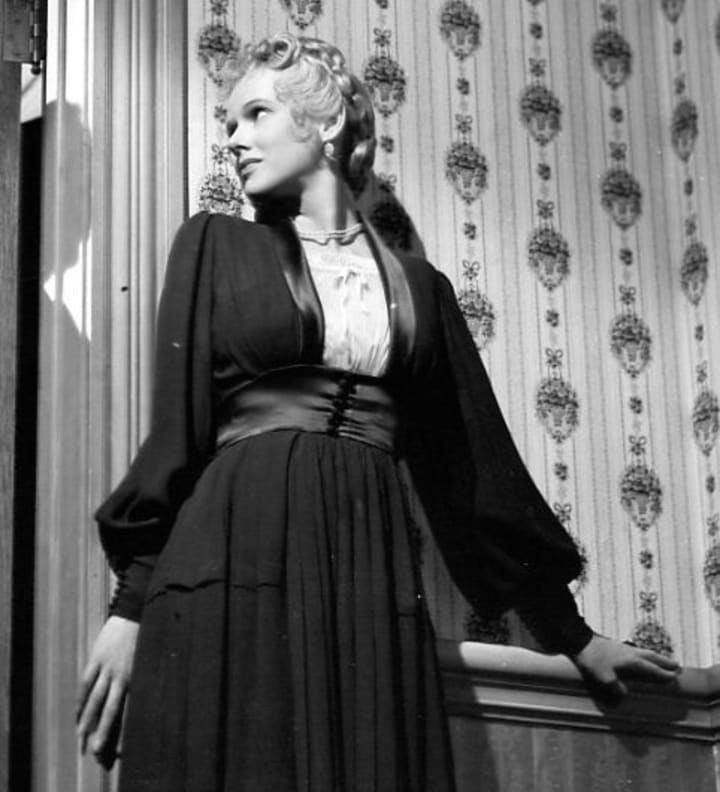Dorothy Comingore (1913 – 1971)
The Unfriendly Fall From Grace

Hollywood is a bully. As an imaginary 1940s Hollywood screenwriter, I have learned to keep quiet, to avert my gaze, not complain. It is my dream job and a nightmare. I want to be a story-teller that weaves magic about sassy women who stand up to the men. But this is 1940s Hollywood, so I know that not all fights, no matter how just, will be won and that gutsy women need to know their place. Cautionary tales about the women who spoke up, hide in every dark corner of every salacious fanzine.
Have you heard what happened to Dorothy?

Dorothy Comingore was a talent. She was discovered by Charlie Chaplin when, along with her boyfriend Robert Melzer, she was a part of the Community Theater in Carmal, California. Chaplin knew acting flair when he saw it, and secured her a Warner Brothers contract.
A pretty girl, even with talent and a studio contract has no guarantee of stardom. A fanzine described her as a “personality cocktail”, but she found herself modelling, showing off her legs rather than her acting repertoire.
And even when she did make it onto a film set, it was no fun – no dressing rooms, all male crews, crude advances.
Dorothy tried her hardest to look after herself. Heck, she was the kind of gal who tried to look out for herself and others. Along with her socialist boyfriend Meltzer she worked with Paul Robeson for the desegregation of white-only United Services clubs. And she was a proud union member.
Dorothy was one wilful woman – which is a reputation only the biggest female stars can afford. Dorothy was no Bette Davis. She only had small roles, like playing the straight girl in a Three Stooges comedy, when she complained about the lack of privacy and dressing rooms. Her big scene was to be thrown into the swimming pool. According to a news report it was the 97th take of being dunked into a cold chlorine bath, when she finally snapped and stomped off set. She was suspended for a month without pay.

That was 1940. By this time her and Robert had split. She had married screenwriter Richard Collins.
In 1941, it looked like her luck would finally change. Orson Welles cast her as the second Mrs Kane, Sarah Alexander in the most critically acclaimed move of the era – Citizen Kane.
Her performance is a part of the film’s success. She plays giggly shop-girl, harried and failed opera star and ageing alcoholic all with great skill and emotional intelligence.
So, we have a beautiful girl in a leading role, in one of the biggest films of the decade receiving critical praise. But, if I asked you to name the big stars of the 1940s, would the name Dorothy Comingore trip off your tongue. Didn’t think so?
And why? Because Hollywood is a bully. There was bullying in all directions for poor Dorothy.

Let’s start on the set of Citizen Kane. Orson Welles had been so impressed with Comingore’s audition that he hired her, even though she was heavily pregnant. But, Welles was known to struggle with women. He was quoted as saying:
“Women are stupid. I’ve known some who are less stupid than others, but they’re all stupid.’
And when it came to working with Dorothy Comingore, Jonathan Lynn reported whilst working with Welles:
“He reminisced about Kane, about how he had mistreated Dorothy Comingore because she couldn’t act well enough so he’d made her cry and sprayed stuff down her throat to make her hoarse.”
Of course, the Hollywood myth is that Welles was a genius and therefore, his idiosyncrasies, such as mistreating actresses, should be accepted as part of the creative process.

And then there was Hearst. Citizen Kane was loosely based on the life of William Randolph Hearst and the role of Sarah Alexander was a version of Hearst’s mistress Marion Davies. It is not a flattering portrayal. Hearst had power and was not afraid to wield it. He set out to bankrupt the young director, and in doing so, Dorothy was collateral damage. Hearst branded them both communists. He succeeded to some extent in reducing the distribution of the film, forcing both Welles and Dorothy’s careers onto the back foot.

Then there was HUAC – the House Committee of Unamerican Activities, which became notorious from the late 1940s for its role in the blacklisting of hundreds of artists and the jailing of the Hollywood Ten.
HUAC had three main concerns in Hollywood:
1. investigating whether pro-communist messages could be found in Hollywood films
2. interfering with Hollywood labour disputes and
3. the glossiest, most head-line grabbing concern – getting people to name names.
There are many ways to describe the work of HUAC. It could be seen as patriotic endeavour. It could be seen an over-reaction to the diversity of views required to ensure a thriving democracy. Or it could just be seen as bullying.
Let’s consider HUAC’s treatment of Robert Melzer, Comingore’s ex-boyfriend from before the war. During the war he fought for the US and died in action in 1944. He was awarded posthumously the Purple Heart. In 1947, the Screen Writers Guild established the Robert Meltzer Award, at first to honor writers killed in battle but later presented to scriptwriters and actors who worked for “freedom of expression and the rights of the writer.”
Nevertheless, in 1951, seven years after dying for his country, HUAC blacklisted Meltzer for his earlier socialist tendencies and the Meltzer award was withdrawn. His courage and creativity were written out of history. It took another forty years for the award to be reinstated.

It was no surprise that Comingore was called to testify. The FBI had a mighty big file on her by the mid-1940s, comprising of her activities pre-war in civil and labour rights. Her ex-boyfriend, Richard Meltzer and her now ex-husband Robert Collins had both been members of the Communist party. She was a marked woman.
Robert Collins attended the HUAC hearings in 1951. Some reports suggest that he asked to do so. At those hearings he denounced his previous communist leanings and named names. He betrayed a number of his colleagues, including those who had provided loans to Robert and Dorothy when they were first married. Dorothy thought this was so shameful, she shaved her head in protest.
The following year, October 1952, Dorothy was called to HUAC.
The following is taken from Kathleen Sharp’s article in the LA Review of Books:
Attorney Frank S. Tavenner Jr. began: “Were you a member of the Communist Party?”
Dorothy moved her lips silently and, after a beat, Tavenner asked why.
“I am counting to 10,” she explained. “I do that occasionally when I am angry.”
“Then, I wish you’d count to 15,” he retorted.
“I’d have to take off my shoe,” she said.
The crowd erupted in laughter, along with photographers’ flash bulbs.

Dorothy was an unfriendly witness. She refused to name names.
She might have won the crowds over, but it came at an extortionate cost. She was set up for a prostitution charge, which was largely believed to be orchestrated by Wheeler of HUAC. This was used in the custody case for her two children, which she lost to her husband.
At rock bottom, she was admitted to an asylum where she remained for two years. This finished her acting career and she has no TV or film credits beyond 1952.
Comingore married twice more after Richard. She died in 1971 at the age of 58, following years of alcohol addiction, mental health issues and a painful back injury.
John Sanford wrote after her death on her performance in Citizen Kane:
You didn’t know, watching her filmed disintegration, that she was living her life in advance. There she was, giving you in two hours, the twenty-five years to come, showing you her incoherence, her nature’s lack of bond, her tendency, her trend towards ending. There, unaware, you saw her long thaw to nothing.
It is a beautiful piece of prose poetry, that suggests that Comingore was a tragic heroine with an inbuilt fatal flaw towards alcoholism and disintegration. Fancy words for saying, “we couldn’t help her”. An articulate shrug of the shoulders.
But really, as I sit with my imaginary typewriter, producing scripts for a 1940s studio, I know there is a different story that could have been told. What killed Comingore’s career was not her inability to thrive, but the inability of others to let her do so.
There is no star on the Hollywood star of fame. There was no academy award. Comingore's talent disappeared from view. But I'm writing this, so that the bullies don't win.
If you've enjoyed what you have read, consider subscribing to my writing on Vocal. If you'd like to support my writing, you can do so by a regular pledge or leaving a one-time tip. Thank you.
About the Creator
Rachel Robbins
Writer-Performer based in the North of England. A joyous, flawed mess.
Please read my stories and enjoy. And if you can, please leave a tip. Money raised will be used towards funding a one-woman story-telling, comedy show.
Reader insights
Outstanding
Excellent work. Looking forward to reading more!
Top insights
Easy to read and follow
Well-structured & engaging content
Excellent storytelling
Original narrative & well developed characters
Heartfelt and relatable
The story invoked strong personal emotions






Comments (3)
GREAT STORY
Wow. Good research and a compassionate & thoughtful handling of the info. No star on the Walk of Fame? That's a walk of shame! Thanks, Rachel, for your really excellent insights into a forgotten (not entirely, thanks to you) artist.
Great to highlight one of the actors persecuted by HUAC. Fascinating story and thanks for sharing